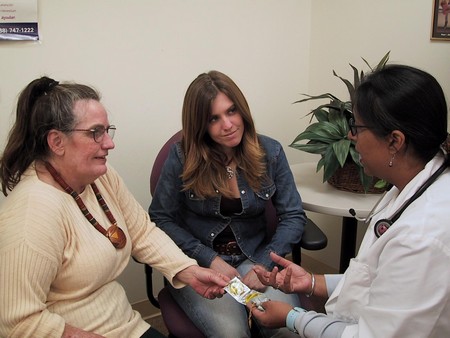Your aims in caring for someone with a communicable disease are twofold: to provide nursing care, and to prevent the spread of infection to others.
Nursing the patient
The type of care you will give depends on the severity and seriousness of the illness. A child with a mild attack of German measles can be kept away from school for a few days and needs little nursing care. An adult with Lassa fever, on the other hand, will have to be admitted to a special isolation hospital and will require intensive medical and nursing care. In such hospitals, elaborate precautions are taken to protect the staff and control.the spread of infection.
As a volunteer you have no place in an isolation hospital, but you may well be involved in nursing an infectious patient in his own home. If this is the case, it is sensible for you to take certain precautions. Eat well and avoid becoming overtired. Wear an overall to protect your clothes and wash your hands carefully after attending to the patient. Turn away from him if he coughs or sneezes when you are attending to him. He should use paper handkerchiefs, which can be put in a paper bag and burned after use, or otherwise sealed in a plastic bag and put in the dustbin.
There is little point in isolating a child with an infectious disease as most infections are caught and passed on within 48 hours. At this time symptoms may be unclear, and by the time the child develops a fever other members of the family will have already been exposed to the infection.
The patient with a communicable disease will have a raised temperature and you should nurse him as you would any patient with a fever. If he also has an irritating rash, you can apply calamine lotion to cool and soothe the skin.
Containing infection
There are several precautions you can take to help prevent the spread of infection. Nurse the patient in a well-ventilated room where possible, with a window open except when he is being washed or treated.
Bedpans and urinals should be taken to the lavatory immediately after use and the contents flushed away. The community nursing sister will advise you if you need to take any other precautions.
Any food left on the patient’s plate after he has finished should be removed and disposed of quickly. Use a fly repellent spray to keep the bedroom and lavatory free of flies and insects.
Give the patient newspapers, magazines and paperback books to read that can be burned after use. If the patient has handled a library book, seal it in a plastic bag with sticky tape and return it to the librarian with an explanatory note. Try to give a child inexpensive toys that can either be burned or washed thoroughly after he has recovered from the illness.
You must be careful not to transmit infection yourself: wash your hands after attending to the patient, after emptying a bedpan and whenever you leave the bedroom before handling anything else.
When the patient is fully recovered, strip the bed. Either send the soiled linen to the laundry or wash it in a washing machine at a very hot setting. Open the windows and air the room thoroughly.
